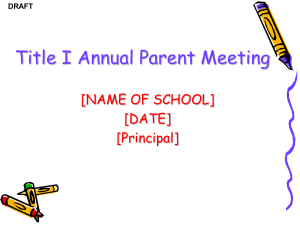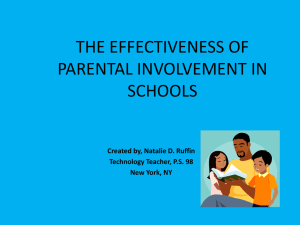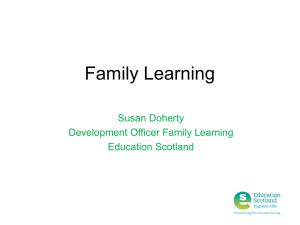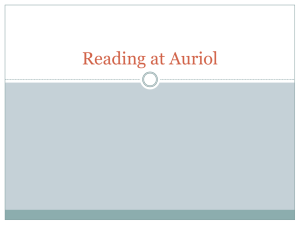Parental Alienation
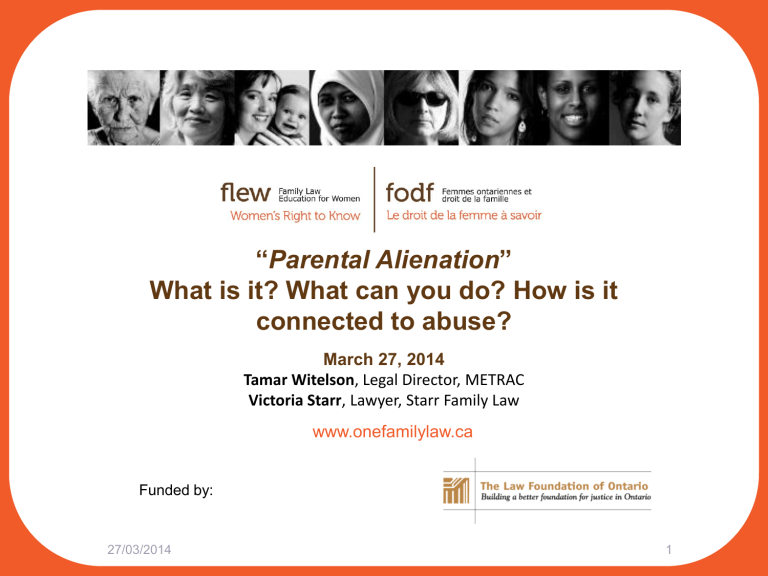
“Parental Alienation”
What is it? What can you do? How is it connected to abuse?
March 27, 2014
Tamar Witelson, Legal Director, METRAC
Victoria Starr, Lawyer, Starr Family Law www.onefamilylaw.ca
Funded by:
27/03/2014 1
METRAC
METRAC, the Metropolitan Action Committee on Violence Against
Women and Children
works to end violence against women, youth and children
a not-for-profit, community-based organization www.metrac.org
METRAC’s Community Justice Program
provides accessible legal information and education for women and service providers
focuses on law that affects women, from diverse backgrounds, especially those experiencing violence or abuse
Family Law Education for Women in Ontario -FLEW
provides information on women’s rights and options under Ontario family law
in 14 languages, accessible formats, online and in print www.onefamilylaw.ca
www.undroitdefamille.ca
27/03/2014 2
Presenters
Tamar Witelson
Legal Director, METRAC
Victoria Starr
Family Lawyer/Mediator/Arbitrator,
Starr Family Law, Toronto
27/03/2014 3
Topics to be Covered
1.
What Does “Parental Alienation” Mean?
2. Reasonable Child Behaviour
3. Signs of Parental Alienation
4. Is Abuse Part of the Picture?
5. What To Do: a) Out of Court b) Going to Court
6.
What Is the Office of the Children’s
Lawyer?
7. Conclusion
8. Additional Resources
Accurate as of the date of this webinar presentation: March 27, 2014
27/03/2014 4
27/03/2014
What Does “Parental
Alienation” Mean?
5
What Does “Parental Alienation” Mean?
• “Parental Alienation Syndrome” term introduced by child psychiatrist Richard
Gardner (1985, United States)
• Gardner described a condition in which a child criticizes and pulls away from one parent, without reason
usually after parental separation
usually the other parent is blamed for influencing, indoctrinating or “poisoning” the child’s view
27/03/2014 6
What Does “Parental Alienation” Mean?
• “Parental Alienation Syndrome” is not a medically recognized disorder
• Gardner’s observations were limited, focused on child custody cases where he believed fathers were “falsely accused” of child abuse
• High conflict parental separation can affect children in many ways:
strong bond with one parent
distance or estrangement from other parent
may or may not involve abuse
27/03/2014 7
What Does “Parental Alienation” Mean?
• A child who persistently expresses
unjustified
negative feelings and beliefs about a parent that are out of proportion to the child’s actual experience with that parent is a legitimate cause for concern
such as anger, hatred, rejection, fear
• May be called “Parental Alienation”
27/03/2014 8
27/03/2014
Reasonable Child
Behaviour
9
Reasonable Child Behaviour
• When separating parents fight over custody of a child, it is common for child to feel:
sadness
guilt
protective of one or both parents
anger at one or both parents
conflict over loyalty to one or both parents
a need to reduce conflict and bad feelings
27/03/2014 10
Reasonable Child Behaviour
• Child behaviour that is justified, or has a reasonable explanation is not “parental alienation”
• Strain, tension, distance in the relationship with one parent is not always “Parental
Alienation”
• There are expected and typical reasons why a child may feel more positive/negative with each parent
27/03/2014 11
Reasonable Child Behaviour
• Some explainable reasons for a child’s positive/negative feelings towards one parent:
greater comfort with the usual primary caregiver
separation anxiety when leaving a comfortable environment
identity with parent of same gender or interests
preference for more material comforts and/or fewer demands on behaviour
27/03/2014 12
Reasonable Child Behaviour
• A child’s reasonable positive/negative feelings towards one parent, related to family breakdown:
anger at the parent who leaves
m oral judgement of a parent’s behaviour
sympathy or worry for rejected parent
disruption in social life and routine
d islike of a parent’s new partner or stepsiblings
27/03/2014 13
Reasonable Child Behaviour
• Signs of reasonable child behaviour:
negative attitudes towards the rejected parent are occasional or reduce over time
negative attitudes may be mixed with positive attitudes and affection
negative attitudes may be directed at both parents at various times
27/03/2014 14
Reasonable Child Behaviour
• Behaviour related to abuse or neglect, such as:
child is/was physically or sexually or otherwise abused by one parent, or by someone else while in care of the parent
c hild witnessed a parent’s violence or abuse against someone else
child was threatened or has a reasonable fear of harm by parent
c hild’s needs are or were neglected by parent
child was abandoned by parent
27/03/2014 15
27/03/2014
Signs of “Parental
Alienation”
16
Signs of “Parental Alienation”
• Context
i ncreasing number of claims of “Parental
Alienation” (PA) in Canadian child custody cases
from 1989-2008, 60% of PA claims upheld
mom was 2 times more likely to be considered the “alienating” parent (moms are more likely to have custody or most time with child)
dad was 3 times more likely to claim PA which is not upheld
27/03/2014 17
Signs of “Parental Alienation”
• Negative child behaviour becomes progressively more severe, for example:
feeling pressure and loyalty conflict between parents
reducing pressure by siding with one parent
adopting more negative views of rejected parent
resisting contact with rejected parent, even when contact has been positive in the past
extreme anger and complete rejection of alienated parent
27/03/2014 18
Signs of “Parental Alienation”
• Concerns about a child’s behaviour arise when there is no reasonable or justifiable explanation
view of parents is one-sided; one parent is
“good” and the other is “bad”
towards the rejected parent:
• vicious response or hatred – verbal and physical
• negative to associated family, friends, pets, possessions
• blamed for separation and current life conditions
• reasons for rejection are false, irrational, trivial
27/03/2014 19
Signs of “Parental Alienation”
view of parents is one-sided; one parent is
“good” and the other is “bad”
towards the favoured parent:
• worried about parent
• cares for or feels the need to care for parent
• defends parent
• denies worry or protection for parent
• mimics what the parent says without an individual view
• parent is idealized
27/03/2014 20
Signs of “Parental Alienation”
• The favoured parent (the alienator)
direct or indirect signs of encouraging the rejection or alienation of the other parent, such as: o rarely talks about other parent or regularly says negative things about other parent o denies other parent has any positive qualities o i nterferes with child’s contact with other parent
• lets child decide if/when to visit
• is upset if child does visit
• discourages phone calls, email, birthday or celebrations of other parent
27/03/2014 21
Signs of “Parental Alienation”
• The favoured parent
encourages the rejection of the other parent: o sends messages through child, puts child in the middle o ignores or destroys messages from other parent to the child o talks about the other parent with disdain o makes child feel guilty for any positive feeling towards other parent o unjustifiably portrays other parent as damaging to child o discusses legal/separation issues with child o asks child to spy on or keep secrets from other parent o threatens to withdraw affection, unless other parent is rejected
27/03/2014 22
Signs of “Parental Alienation”
• The rejected parent’s behaviour can make things worse, such as:
says negative things about other parent
makes child feel guilty
i gnores or rejects child’s feelings
argues with child, tries to convince, or punish to change behaviour
overly strict rules or complete resignation and rejection of child
discusses legal/separation issues with child
sends messages with child, puts child in the middle
27/03/2014 23
Presenters
Tamar Witelson
Legal Director, METRAC
Victoria Starr
Family Lawyer/Mediator/Arbitrator,
Starr Family Law, Toronto
27/03/2014 24
27/03/2014
Is Abuse Part of the
Picture?
25
Is Abuse Part of the Picture?
• Richard Gardner invented the label “Parental
Alienation Syndrome” to combat claims of child sexual abuse against fathers, which he viewed as commonly false
• Research shows 50-70% of child sexual abuse claims are valid
• A child’s fear and rejection of a parent for abuse is justifiable and not “Parental Alienation”
• A parent’s legitimate concern for a child’s safety is not “Parental Alienation”
27/03/2014 26
Is Abuse Part of the Picture?
• Partner Abuse and Violence
criticism and de-valuing of a parent in front of a child by the other parent is a form of domestic partner abuse
encouraging a child to reject a parent without justification may be a continuation of partner abuse
the risk of partner abuse and violence increases immediately after separation
custody battles can be used as a tool to attack a person’s competence as a parent, identity and dignity
interference with a mother-child relationship may be a profoundly damaging tactic of woman abuse
27/03/2014 27
Is Abuse Part of the Picture?
• Child Abuse
child’s right to have a meaningful and beneficial relationship with both parents is threatened or lost
a lienating parent exploits child’s lack of power and control
r isks of harm to child from “Parental Alienation” o Short Term
• stress
• emotional distress
• taking on adult responsibilities to protect favoured parent
• guilt or regret from loss of rejected parent
• health: depression, self-harm, eating problems, cutting
27/03/2014 28
Is Abuse Part of the Picture?
Risks to child from “Parental Alienation” o Long Term (still being researched)
• ongoing emotional distress
• low self-esteem; belief in inadequacies like rejected parent
• ongoing dependence on favoured parent
• fear of loss of favoured parent
• rigid, black/white view of world
• self-blame
• depression
• difficulty with interpersonal relationships
27/03/2014 29
Presenters
Tamar Witelson
Legal Director, METRAC
Victoria Starr
Family Lawyer/Mediator/Arbitrator,
Starr Family Law, Toronto
27/03/2014 30
What To Do: Out of Court
27/03/2014 31
What To Do: Out of Court
Tips to avoid or deal with “Parental Alienation”
• Both parents should:
follow terms of a custody agreement or Court Order
stay positive with child
avoid being negative about other parent
not involve child in legal or parental discussions
not use child as messenger between parents
use an online program to communicate with other parent o e.g. Our Family Wizard
keep personal record of positive activities and concerns
save or copy all notes, cards, documents, email, texts, record of phone calls
27/03/2014 32
What To Do: Out of Court
• Services to Support Parents
Talk to a lawyer
Parenting Course o geared to child’s age o t o better understand child’s needs and concerns o to respond and positively interact with child
Conflict Resolution Course o specifically for separating parents o to improve communication, respect, trust o e.g. Families in Transition
Mental Health Professional o expert in high conflict parental separation o more specific to the individual parents and child o help to reasonably respond to difficult situations
27/03/2014 33
What To Do: Out of Court
Alternate Dispute Resolution (ADR) o consult a lawyer o to resolve disputes between parents
• mediation (best at early stage)
• parenting coordinator
• arbitration o See webinar: “Conflict, Court or Another
Way? Different Ways of Resolving a Family
Dispute” www.onefamilylaw.ca/en/webinar/
27/03/2014 34
What To Do: Out of Court
• Services to Support Child
Talk to a lawyer
Child Therapist o emotional outlet and counselling
Mental Health Expert Report o r eport on child’s views and preferences; provide opinion
Brief Focused Assessment o report on parental conflict and effects on child o provide ideas for practical solutions
Children’s Aid Society o may assist or refer child and family to community services o can intervene if CAS believes child is in need of protection
27/03/2014 35
What To Do: Out of Court
• Family Counselling
s hould have expertise on “Parental Alienation” and child rejection of a parent (estrangement)
identify your concerns about parent/child relationships
child, both parents, new partners, other family members should prepare to attend
only a parent with custody can agree to involve child
consider: will counselling be confidential (closed) or open, with a professional report and recommendations
27/03/2014 36
What To Do: Out of Court
• Keep in mind: you may end up in Court
courses, counselling, assessments and reports may be viewed by the other parent in a Court proceeding
“out of Court” information could become evidence in Court
you can agree in advance that a document will not be used in Court and an expert will not be called as a witness
if it is to your benefit, you can agree in advance that a document and witness can be used in
Court
27/03/2014 37
Presenters
Tamar Witelson
Legal Director, METRAC
Victoria Starr
Family Lawyer/Mediator/Arbitrator,
Starr Family Law, Toronto
27/03/2014 38
What To Do: Going to Court
27/03/2014 39
What To Do: Going to Court
• Other solutions are not working
• Court involvement may be appropriate
• Court has broad powers, can order one or several of the following:
ask judge to caution parties about behaviour
a sk judge to “case manage” and keep case moving
Review Order: parties return to Court every week or two to report
27/03/2014 40
What To Do: Going to Court
• Court can:
o rder “Section 30 Assessment” (under Ontario
Children’s Law Reform Act
) o in custody/access case, Court can appoint a professional to “assess and report” on the needs of the child, and whether the parents can satisfy those needs o Court can order parents and child to attend assessment
Request involvement of the Office of the
Children’s Lawyer
27/03/2014 41
What To Do: Going to Court
• Court can order:
a parent or child to participate in a course or counselling, such as: o parenting, conflict resolution, individual or family therapy
psychological assessment
Brief Focused Assessment
a very specific parenting agreement
supervised exchanges of child
supervised visits with child
police enforcement
27/03/2014 42
What To Do: Going to Court
• Court can order:
spousal support reduced to pay for counselling
a parent is declared “vexatious”
a parent must pay the other parent’s legal costs
a parent is “in contempt” of Court and order a penalty, such as fine or jail
a limit or increase on parental time with child
a change in child custody
no parental contact with child
27/03/2014 43
What Is the Office of the
Children’s Lawyer?
27/03/2014 44
What Is the Office of the Children’s
Lawyer?
• Ontario Office of the Children’s Lawyer (OCL)
free, government-funded lawyers and clinical investigators who will assist the court to help children under 18
Court, or usually at one parent’s request can request
OCL to get involved in a case
OCL may:
Not take case
appoint a lawyer to report to Court on child’s views and preferences and take a position on behalf of the child
conduct a “clinical investigation” and make recommendations to the parents and Court
determines strength, consistency and independence of child’s views and preferences
27/03/2014 45
What Is the Office of the Children’s
Lawyer?
advances a position on behalf of the child
makes recommendations to the Court
p osition might not mirror child’s stated views and preferences
does not represent either parent
does not take instructions from parents
may speak to parents and others to get more information about the child
27/03/2014 46
Conclusion
• High conflict parental separation and custody disputes may affect children and their parental relationships
• Justified withdrawal from a parent is not “Parental
Alienation”
• Make sure arrangements and Court Orders are detailed
• Follow custody agreements and Orders
• Stay positive with child
• Consider out of Court supports
• Consult a lawyer
• Don’t wait, take action sooner rather than later
27/03/2014 47
Presenters
Tamar Witelson
Legal Director, METRAC
Victoria Starr
Family Lawyer/Mediator/Arbitrator,
Starr Family Law, Toronto
27/03/2014 48
27/03/2014
Additional Resources
49
Online Basic Information
Ministry of the Attorney General www.attorneygeneral.jus.gov.on.ca/english /
• 1-800-518-7901 (toll free)
• 1-877-425-0575 (TTY)
Family Law Information Program (FLIP) www.legalaid.on.ca/en/getting/flip.asp
Family Law Information Centres (FLICs) www.legalaid.on.ca/en/getting/type_family.asp
Family Law Services Centres (FLSCs) www.legalaid.on.ca/en/contact/contact.asp?type=flsc
Family Law Education for Women (FLEW) www.onefamilylaw.ca/en/resources/
Ontario Women’s Justice Network (OWJN) www.owjn.org
27/03/2014 50
Domestic Violence and Abuse
• Assaulted Women’s Helpline www.awhl.org
24 hours/7 days; multiple languages
Toll-free: 1-866-863-0511; TTY: 1-866-863-7868
• Ontario Coalition of Rape Crisis Centres http://www.sexualassaultsupport.ca/
• Network of Sexual Assault/Domestic Violence Treatment Centres www.sadvtreatmentcentres.net
.
• Victim Services Directory www .
justice.gc.ca/eng/pi/pcvi-cpcv/vsd-rsv/index.html
• Barbra Schlifer Legal Clinic
Toronto: 416-323-9149 x278 (legal intake) TTY: 416-3231361
Free counselling, referral, legal and interpreter services to survivors of violence
(Family, Criminal and Immigration law)
• Family Violence Authorization Program (Legal Aid Ontario)
Free 2-hour emergency meeting with a lawyer
Offered through some shelters and community legal clinics
Toll-free: 1-800-668-8258; TTY: 1-866-641-8867
27/03/2014 51
“Parental Alienation” Resources
• co-parenting communication guides www.afccnet.org/Portals/0/PDF/AzAFCC%20Co parenting%20Communication%20Guide.pdf
www.ourfamilywizard.com/ofw/ www.afccontario.ca/resourcesparentschildrenpr ofessionals.html
27/03/2014 52
Looking for a Lawyer
• Helpful to talk to a lawyer
ask for free first consultation
discuss cost of fees and disbursements
• Legal Aid Ontario www.legalaid.on.ca/en/getting/default.asp
416-979-1446 (Toronto)(accepts collect calls)
1-800-668-8258 (toll free)
1-866-641-8867 (TTY)
• Office of the Children’s Lawyer www.attorneygeneral.jus.gov.on.ca/english/family/ocl
27/03/2014 53
Looking for a Lawyer
Legal Aid Ontario
• for low income people
• 20 minutes Summary Legal Advice
• Family Court advice lawyers
at Family Law Information Centres (FLICs)
• Family Law Service Centres
help with documents
help to get lawyers
• If your partner is violent or abusive
Family Violence Authorization Program
free 2-hour meeting with lawyer
offered through some shelters and community legal clinics
Toll-free: 1-800-668-8258; TTY: 1-866-641-8867
27/03/2014 54
Looking for a Lawyer
• JusticeNet
not for profit service
reduced legal fees www.justicenet.ca/professions
• Canadian Family Law Lawyers Network (National) www.cfln.ca
• Law Society of Upper Canada Lawyer Referral
Service www.lsuc.on.ca/with.aspx?id=697
416-947-3330 (Toronto)
1-800-268-8326 (toll free)
416-644-4886 (TTY)
27/03/2014 55
Looking for a Lawyer
Community Legal Clinics
• can refer to services; may do some family law www.legalaid.on.ca/en/contact/contact.asp?type=cl
Toolkit for a good Client-Lawyer Relationship schliferclinic.com/vars/legal/pblo/toolkit.htm
• Barbra Schlifer Commemorative Clinic
See FLEW Webinars :
• Where to Look for a Family Law Lawyer
• Your Day in Family Court: How to Prepare and What to
Expect www.onefamilylaw.ca/en/webinar/
27/03/2014 56
Resources
Ontario Courts www.ontariocourts.on.ca/
• Online guide provides an overview of all courts in Ontario
• Information on family courts:
– Superior Court of Justice www.ontariocourts.ca/scj/en/famct/
– Ontario Court of Justice www.ontariocourts.ca/ocj/familycourt/overview/
Ontario Court Locations www.attorneygeneral.jus.gov.on.ca/english/courts/Court_Addresses/
• Find court addresses across Ontario
27/03/2014 57





